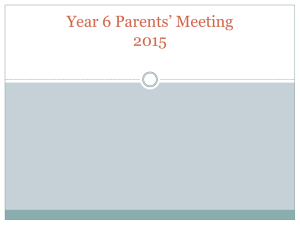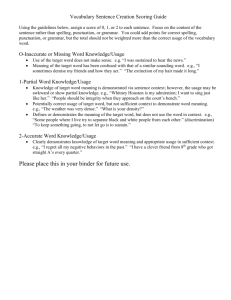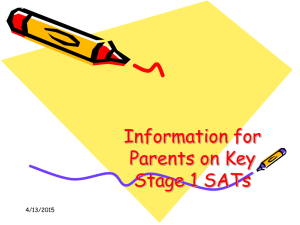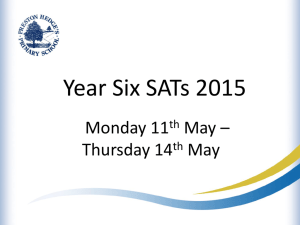Year 6 SATs Information Evening
advertisement
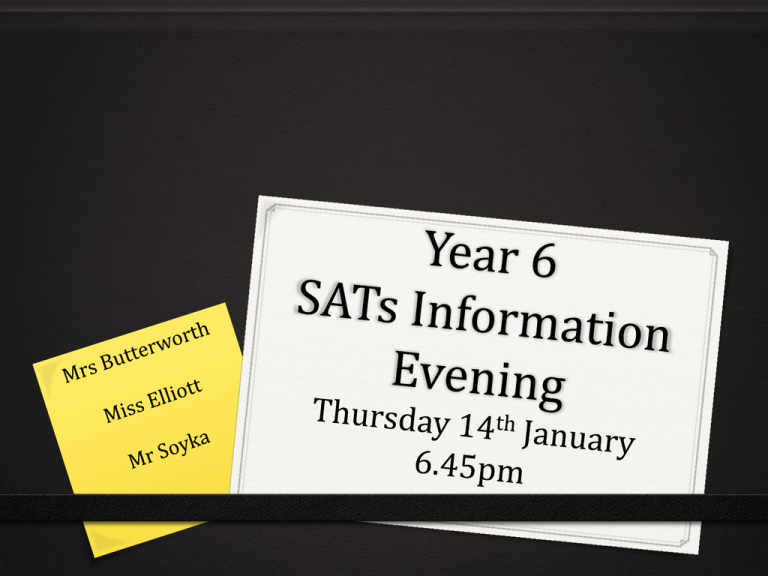
Objectives 0 Changes to the 2016 SATS 0 Maths 0 English 0 SATs Timetable 2016 0 Revision tips and advice 0 Any Questions What are SATs? 0 The key stage 2 national curriculum tests are designed to test children's knowledge and understanding of specific elements of the key stage 2 programmes of study. They provide a snapshot of a child’s attainment at the end of the key stage. Changes 2016 0 Instead of levels, scaled scores 0 No extension tests – ie no equivalent to Level 6 0 The scaled scores are likely to look like this: 80 (minimum) 100 (expected standard) 0 Pupils’ test scores will be mapped onto the scale 130 (maximum) (conversion tables will only be published in JULY) Maths NO MENTAL MATHS TEST - instead a written arithmetic paper (non-contextualised questions) 36 questions (40 marks) in 30 minutes Question will include – Straightforward addition and subtraction (1 mark) More complex calculations with fractions (1 marks) Long division and multiplication (2 marks) 2 written reasoning papers at 40 minutes each (35 marks each) Children’s marks from all three tests are combined to calculate their overall mathematics level. Sample Arithmetic Questions 1034 + 586 = 20% of 1,500 = 54 x 23 = 12 – 6.01 = Tips for Maths Revision 0 Times Tables and inverted division facts 0 Online games, including SAM learning, My Maths and Abacus 0 Overlearning key facts such as metric conversions and shape names and properties 0 Try to do something daily - every little helps! 0 Use old SATS papers online for extra revision – please avoid 2015 and the sample papers for the 2016 test. English: Reading 0 Children are given 3 or 4 unrelated texts of increasing difficulty in the English reading booklet, including fiction, non-fiction and poetry. 0 There is a greater focus on fiction 0 Instead of being given 15 minutes reading time and 45 minutes to answer the questions, children will have a total of one hour to read the texts and complete the questions at their own pace. 0 There are 50 marks available – approximately 40% are for retrieval and literal questions; 40% for inferential questions (using PEE) and 20% on language for effect and meaning of words. 0 Roughly a mark per minute English: Reading Example 0 Extract from Giants: And how would you like it, Supposing you were a frog, An emerald scrap with a pale, trembling throat In a cool and shadowed bog, If a tremendous monster, Tall, tall, so that his head seemed lost in the mist, Leaned over, and clutched you up in his great fist…. EXPLAIN TWO THINGS THAT THE WORDS EMERALD SCRAP SUGGEST ABOUT THE FROG? Sample Answers 0 It’s green and it’s small 0 It tells us what the frog looks like 0 It means the frog is little and worth nothing 0 Emerald shows the frog is green and scrap tells us that it is unimportant 0 1 2 English: Writing 0 Since 2012 writing has been Teacher Assessed at the end of KS2. 0 Throughout the year children are taught a range of fiction, non-fiction and poetry topics. They have opportunities to write across the genres. 0 We assess their writing throughout the year. 0 We have also recently introduced ‘The Big Write,’ which will give children weekly opportunities for extended writing English: Writing Teacher Assessment Framework When you receive your child’s SAT results, you will also be given their writing teacher assessment. This will be judged as follows: Working towards the expected standard Working at the expected standard Working at greater depth within the expected standard English: SPaG 0Spelling 0Punctuation 0Grammar English: SPaG The English grammar, punctuation and spelling test has two components, worth a total of 70 marks: • a booklet of short-answer questions, 45 minutes, 50 marks (Punctuation and Grammar) • a spelling task , worth 20 marks • The style of questions will be similar to previous years but there will more challenging (L6 style questions) towards the end of the paper. Tips for English Revision 0 Children should be reading for at least 25 minutes every night. 0 Encourage your child to read a wide range of genres and authors (see suggested reading list) 0 Participate in the ‘Read for my School’ challenge and log as many books as possible 0 Discuss books and authors together 0 Learn spellings every night and discuss meaning of unfamiliar vocabulary 0 Online games, including those on SAM learning, Wordsmith and Grammar and Spelling Bug 0 Encourage your child to edit any homework, with a focus on spelling, grammar and punctuation. SATS Timetable 2016 Monday 9 May Tuesday 10 May Wednesday 11 May Thursday 12 May English reading test, reading booklet and associated answer booklet. English grammar, punctuation and spelling test, Paper 1, short answer questions. English grammar, punctuation and spelling test, Paper 2, spelling. Mathematics, Paper 1, arithmetic test. Mathematics, Paper 2, reasoning. Mathematics Paper 3, reasoning. Tips for Parents 0 SATs can be a worrying time for your child and can lead to 0 0 0 0 0 0 nervousness as the tests approach. Good coping strategies include: Reassure them that they just can only do their best on the day. Encourage them to spend at least 20 minutes a day on revision or practice. Keep an early and regular bedtime routine in the days leading up to and including the test week. Research shows that children who miss breakfast perform worse in late morning. Check your child can tell the time accurately so they will know how long there is to go in each test. Please ensure your child is in school early, as arriving late may cause them to panic. Further Tools for Revision CGP Reading comprehension Revision £1.50 CGP Grammar , punctuation and Spelling £3.50 CGP Arithmetic £3.50 CGP New KS2 Maths questions book. £1.60
